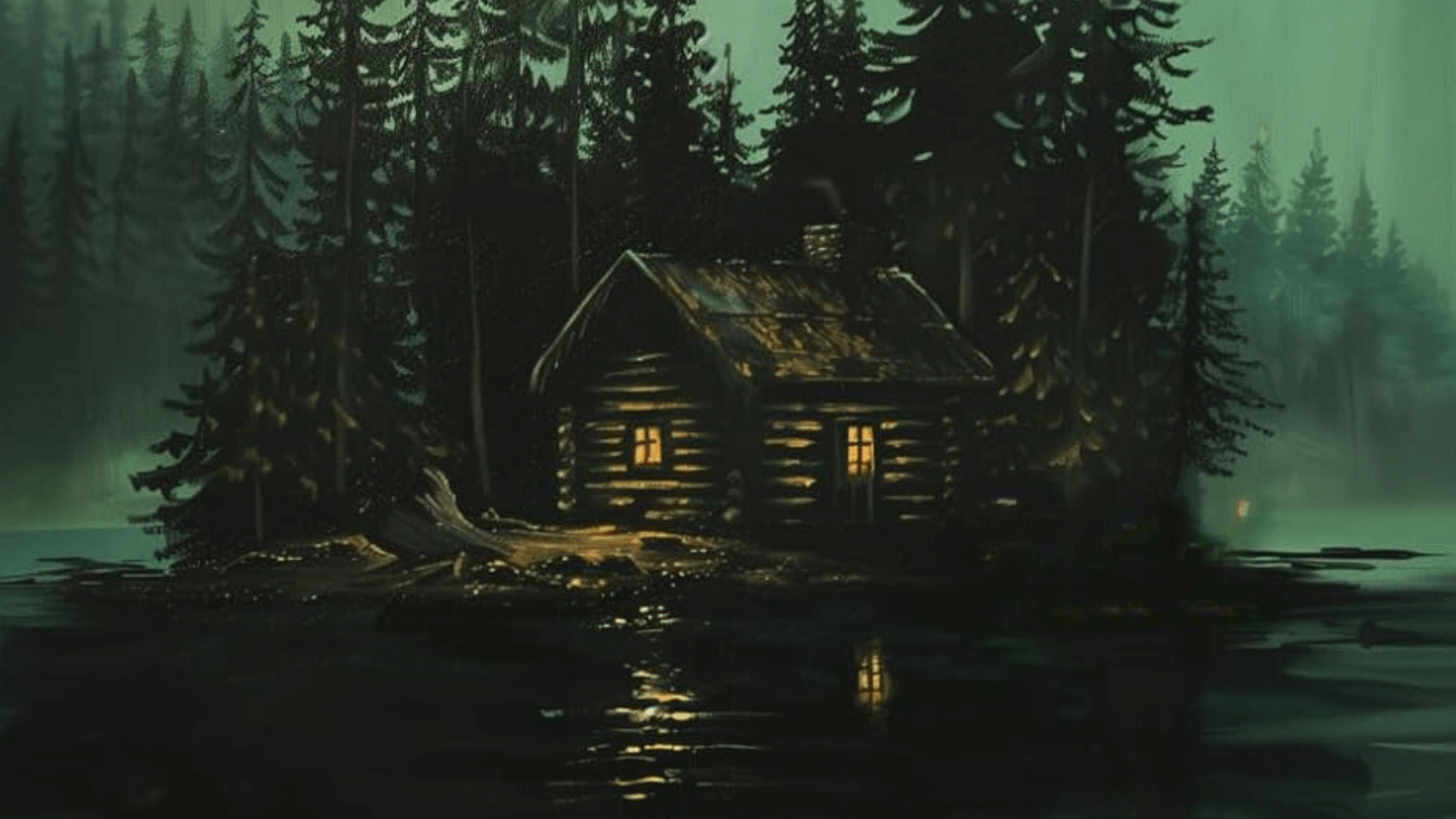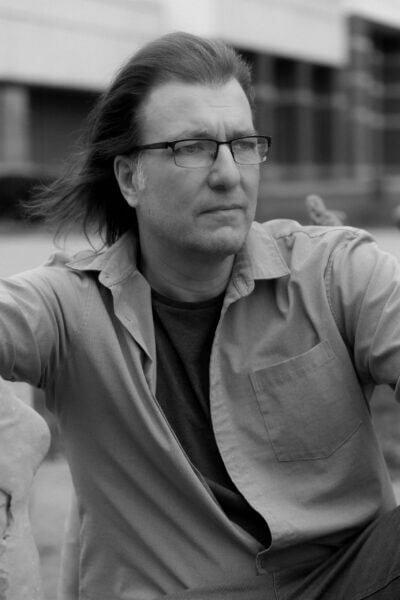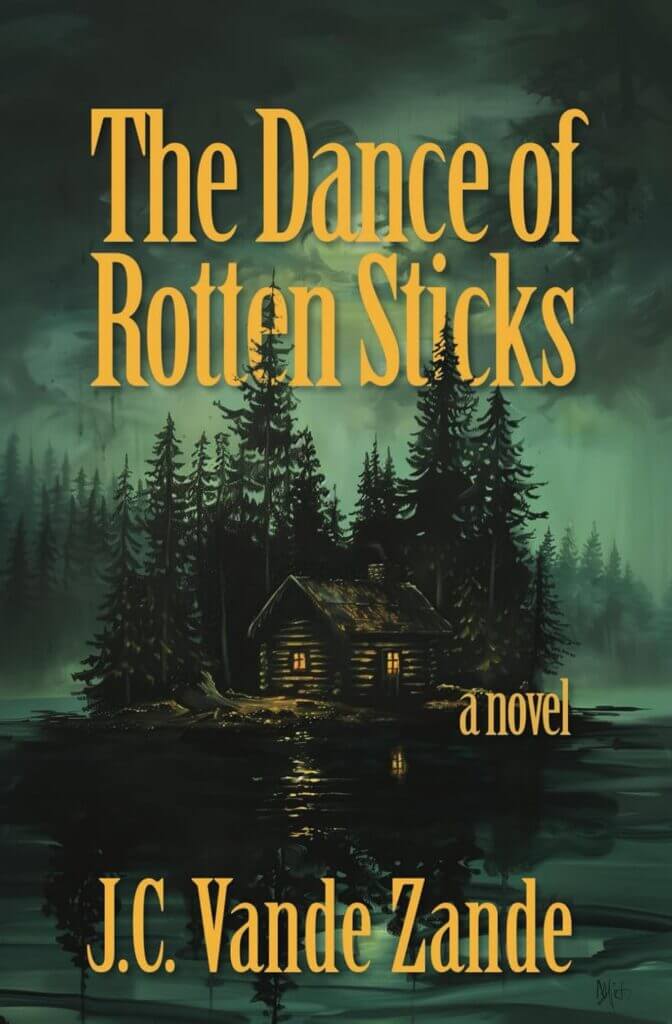
Interview: Jeff Vande Zande, Author of The Dance of Rotten Sticks
By Brian Eggert | August 23, 2024
Jeff Vande Zande is a Michigan-based professor, filmmaker, and author. A poetry and narrative fiction writer who explores themes of working-class life and small-town America, Vande Zande has penned several novels, short stories, and collections of poetry. His involvement in the literary community extends to literary festivals, readings, and workshops. He has also been recognized for his involvement in independent filmmaking, winning several awards at film festivals for his work. I’ve been lucky enough to see early versions of Vande Zande’s short films, which I find often play like humorous or macabre short stories, sometimes with aspects of both.
His latest book, The Dance of Rotten Sticks, debuted this month from Montag Press. Framed as a Midwestern Gothic, the story involves a widower named Isaac who turns to alcohol in his grief, struggles to raise his children, and finds his life upended by some spooky local legends and supernatural phenomena. Despite the presence of ghosts, folkloric spirits, and even some symbolically loaded lampreys, the thrust of the novel deals with a troubling and isolated domestic situation on a small island.
I talked to Vande Zande about his latest work, the intersection of literary fiction and filmmaking, and how the book drew from a personal place.
BE: I’ve seen more of your short films than I have read your books at this point. How do these two creative outlets, writing and filmmaking, relate to each other in your role as an artist?
JVZ: I think sometimes we pigeonhole ourselves as a certain kind of creator. And I think experimenting with any kind of creativity is going to feed whatever your primary outlet is. If you’re a fiction writer strictly, your fiction could still be served by taking a poetry course or attempting some poems. The understanding of how language works in a poem can find its way into your novel.
For a while there, I was fascinated with how screenwriting just really focused on story. Even in the writing, a screenplay is closer to technical writing than it is to fiction. It’s very stripped down and just basics. Because, as you know, it’s often described that a screenplay is just a blueprint for a house. You can’t live inside a blueprint, but you wouldn’t make a house without one. And the same goes for filmmaking; you wouldn’t shoot a film without a script, even if the final product is going to be very different from the script. So, I like that stripped-down focus on the plot and how the narrative structure is put together. I do think my fiction has changed based on my study of screenwriting. You read the book. I hope you found it at least visually engaging in terms of how I’m trying to work the words like a camera.
I definitely felt a sense of cinematic visual imagery while reading it. Maybe this is just how my movie-soaked brain works. But I saw notes of Stanley Kubrick’s version of Stephen King’s The Shining and Robert Wise’s version or Shirley Jackson’s The Haunting. Were you consciously drawing imagery or themes from those stories?
I will say this as somebody who’s writing or attempting to write horror: I don’t know if I would have written The Dance of Rotten Sticks if I hadn’t tried horror in some filmmaking. Because horror is not on my radar at all. I’ll say this with embarrassment: I’ve never read a Stephen King book. Not a one. And I’m not familiar with the Shirley Jackson story that you mentioned. That’s why I worry about this book. Am I too literary for horror and too horror for literary? Am I just going to be in this kind of no man’s land where nobody wants to read the book?
 Well, if you attach the horror label to it, there’s an inbuilt audience for this sort of thing. The marketing and blurbs about The Dance of Rotten Sticks call it a “Midwestern Gothic.” I see notes of Southern Gothic and also classical European Gothic. Given that you’re not versed in some classic horror, does the term Midwestern Gothic, besides the setting, in your case Mighican, mean anything to you?
Well, if you attach the horror label to it, there’s an inbuilt audience for this sort of thing. The marketing and blurbs about The Dance of Rotten Sticks call it a “Midwestern Gothic.” I see notes of Southern Gothic and also classical European Gothic. Given that you’re not versed in some classic horror, does the term Midwestern Gothic, besides the setting, in your case Mighican, mean anything to you?
It doesn’t. I know what Gothic is. This is why I call it Gothic, or I wanted to call it “literary horror,” because, for me, it’s just as much about Isaac’s overcoming his inner demons. Until he overcomes the drinking, he’s not going to deal with the forces of evil on the island. He’s too blinded by his own world. I was writing that book while I was quitting drinking. I’m an alcoholic three years sober now. So even while I was quitting drinking, it was while I was going through the period of realizing that I’m just like my old man. I’m a problem drinker. I’m drinking every day. I’m mildly hungover every morning. I thought to myself, I think I have a problem. My realization kind of came through as Isaac’s realization. So I’m dealing with that too in the book. And I think it’s a book just as much about addiction as it is about the horror on the island and whatnot.
To tie my point together, it was my experimentation with horror in film that kind of piqued my interest about a genre that I had no interest in. I’ve never been a horror reader. Horror, for lack of a better term, scares me. I don’t like it. Not in a good way. I’m not titillated. I’m just kind of like pissing myself and not wanting to go to bed that night because I know I’m gonna dream all those images that I just saw. I think the last horror film I saw a long time ago was The Descent. What really scared me about that film was the spelunking because I am claustrophobic. So those scenes when they’re getting stuck in between the rocks, I was like bring on the demon creatures down below. At least I can run and move.
In the book, you’ve got a haunted orphanage and ghosts that speak to children and older mystics, among other Gothic horror traits. Yet, to me, your book registered more as Folk Horror than Gothic, largely due to your use of Nature. Even the old orphanage in the story has the line “Mother Nature is the Providential Parent” as the motto. Did you think at all about Folk Horror when writing this book?
I’m definitely familiar with the idea of folklore horror and horror in nature. There is an evil force at work, and in developing that, I realized that the lamprey have a connection there. I purposely built in a lot of that. And that’s why the lamprey are really these parasitic creatures in nature. They survive by destroying others, but they’re only acting on their nature. You couldn’t say a lamprey is evil because it attaches to the side of a lake trout.
There’s a scene in the book about a wood tick that gets on the dog, and it’s so greedy in its parasitic-ness that It can’t even move once they pull it out of the dog because its body is so big. Its little legs won’t work, and I’ve seen a tick do that because they’ll keep feeding until they eventually drop off if you don’t pull them out. So the tick and the lamprey, but also people. At one point early in the book, Isaac says he sees all men as predators or parasites. So he buys his daughter a canister of mace for her birthday. Even the book’s evil characters are still just acting on their nature. One character asks about a storm, and another character replies that the storm isn’t good or bad. It’s just a phenomenon in nature.
I think it is refreshing in that, unlike a lot of Folk Horror stories, nature in your book isn’t necessarily evil or a pagan force. To your point, it’s more of a natural thing. The lamprey, by the way, I wasn’t really familiar with them. I did some reading about lampreys while reading your book, and they are terrifying little creatures. I think they may have inspired the look of the “shit weasels” from Stephen King’s Dreamcatcher; the movie version, anyway.
They get pretty long, too. My brother still fishes out on Lake Superior, and they pull in fish that have lamprey scars. My brother-in-law worked for the Fish & Wildlife Service, so he was actually a big consultant on the book. In the book when they’re dealing with lampricide, I ran all of that by my brother-in-law because that’s what he did for 30 years. He would go and camp on these rivers. He’s always said we are a lamprey abatement program, and the lampreys will never be eliminated. Because they’re just too ingrained in the ecosystem of the Great Lakes now. They would never attack a person, but still, the idea that they’re in there.
Isaac, the main character, is an alcoholic. Horror often features an alcoholic who’s seeing things. What is it about horror in general that lends itself to alcoholics?
In the case of The Dance of Rotten Sticks, I think that the horror is him not wanting to face what’s happening both in his life and with his mother-in-law getting ready to take his kids away. The alcohol is the root of the problem, and the horror just sort of conveys that.
You gave up drinking a few years back. How did that shape your story and how you treat alcohol in the book?
At the time I was writing it, I was having the realization, probably even subconsciously, that my drinking was problematic. I was starting to mirror my father. My dad was an alcoholic and benevolent one, a really good guy. He would have never raised his voice. I mean, in some ways, when he was sober, you wanted him to drink because he was more gregarious. I was starting to see it, though, because even though it didn’t greatly affect the people around him, it affected my Dad’s health. I mean, he had Type 2 diabetes because he was a big brandy drinker. So a lot of sugar in that. He died at 68 from esophageal cancer, which was directly related to the drinking. I was drinking actively at the time, but I think I was in the process of seeing that this is a problem. I had to do something because it was kind of like alcohol was my own lamprey; it sucked onto me, and it was taking my lifeforce, and it was taking my quality of life. But I didn’t quit until the spring of 2021.
Then, during COVID, I had a lot of time where I was just staring at my computer, and there was nothing to do. So, I just started writing these books, Rules of Order and The Dance of Rotten Sticks. But I think it was the book that helped me realize, too, that I am Isaac. I need to do what he did. I need to have the resolve to just say no more. Like, I can’t have drinks on a Saturday and then that’s it. Or maybe I’ll take Tuesday night off for a little bit of a recovery night and to prove to myself that I can do it. But on Wednesday, I’m right back on the bottle. I did a pretty big turnaround with it. I went full board. I went back to the gym. I decided to make it more than just about quitting the drinking, but overall, just healthier choices.
That’s a big accomplishment. You should be proud. In recent years, you’ve also been hopping from one genre to another with your books. Much of your earlier work could be described as straightforward literary drama. But in recent years, you’ve a sort of JG Ballad-esque dystopian novel with Rules of Order, and now a Gothic or Folk Horror novel. Are you consciously exploring genres or coming up with a story first and then a genre that fits your story?
When a story comes to me, I spend a good three or four weeks hoping my story ideas will go away. Sometimes, I’ll just wake up, and I’m not thinking about it anymore. And then I just realize there were no teeth to that because I don’t care about it. It took a while, but it was probably a good month of me saying, “No, you’re not a horror writer.” But I couldn’t shake this idea. So, I wrote. What my inspiration gives me—well, it’s giving less and less. I can talk myself out of almost any project now and just be like, “It’s been done,” or “This is a stupid idea,” or “You’re gonna exhaust yourself.” I’m trying to talk myself out of an idea right now because it seems premature. I have a pretty good fleshing out of a sequel to The Dance of Rotten Sticks. I could start writing the sequel now. But it’s the capitalistic part of me that says, “But you have to wait and see how the first book does.” Otherwise, who would I be writing this for?
On a final note, I wanted to commend you for capturing the familiar flavor of Midwestern life, from the domestic scenes to the familiar environments of cabins and going “up North.” You also captured the Midwestern importance of small talk and passive-aggressive relationships with family members. As a Minnesotan, this is very relatable. I’m thinking specifically of the protagonist’s relationship with the mother-in-law character. It made me wonder how consciously you incorporate these details, or whether, perhaps, they’re so familiar that you unconsciously weave them into your novel because that’s what you know?
Probably the latter. But I would imagine just because I’m not consciously building that in, so I think it’s part of my constitution, part of who I am. These characters are amalgams of people I’ve known myself. But yeah, the domesticity. I had a reader who is a straight-up literary guy, and he read it. He said, “This book is great. Why don’t you take out all the paranormal crap?”
That’s actually what I love about horror. It’s a device to underscore the conventional drama and draw out those themes with potent imagery.
Order The Dance of Rotten Sticks using the link below to Amazon, and DFR will receive a portion of your purchase as part of their Affiliate Program.
Unlock More from Deep Focus Review
To keep Deep Focus Review independent, I rely on the generous support of readers like you. By joining our Patreon community or making a one-time donation, you’ll help cover site maintenance and research materials so I can focus on creating more movie reviews and critical analysis. Patrons receive early access to reviews and essays, plus a closer connection to a community of fellow film lovers. If you value my work, please consider supporting DFR on Patreon or show your support in other ways.
Thank you for your readership!
Brian Eggert | Critic, Founder
Deep Focus Review





